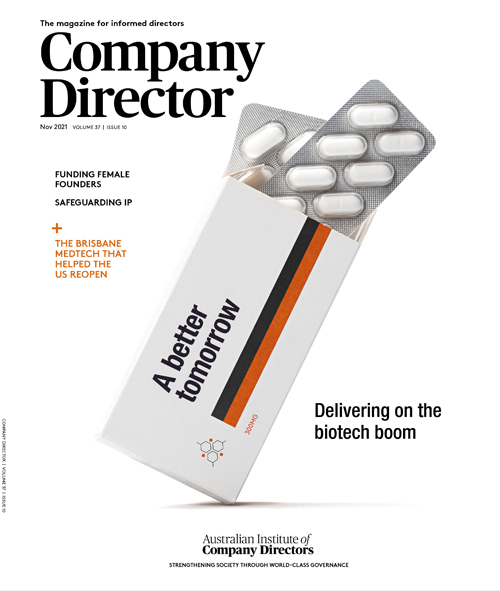Goanna Education is an Australian-owned First Nations enterprise. Co-founder, non-executive director and Dunghutti man Liam Harte AAICD and CEO Sally-Anne Browner outline the demands of scaling for growth.
Liam Harte AAICD
I met the CEO of [First Nations social purpose enterprise] Goanna Solutions, Corey Brown, on an Indigenous accelerator course run by EY, which sparked a conversation about ensuring that a digital divide between Indigenous and non-Indigenous people does not eventuate.
Goanna was approached by Amazon Web Services (AWS) to take part in a global program named AWS re/Start, a stepping stone for people without prior technical education to gain the technical and soft skills required. AWS was keen to support engagement with the Indigenous community in Australia as well as supporting career-building opportunities for people from a range of diverse backgrounds. The first AWS program run by Goanna Education began in early 2020.
In July, Goanna Education became a registered training organisation, which means it can offer courses that are recognised across the Australian qualifications landscape. The team launched its first IT Diploma, in partnership with the Australian Computer Society, in August.
There are emerging signs of change around the vocational education sector in Australia — and concerns about the time it takes for learners to gain skills and whether those skills match industry needs. Goanna Education has a different approach — upskilling people first in an intensive immersive program, as well as a range of soft skills.
Goanna governance
From a governance point of view, the most challenging aspect over these past 18 months has been transitioning our governance arrangements from a hands-on early-stage business venture into a more mature structure with clearer distinctions between the board and the hand-picked executive team. This mature model had to strike a balance with significant growth, handing off decision-making while maintaining our commitment to our original purpose and ensuring our regulatory compliance continued to be attended to. The reality in the early days was that there were plenty of voices around the table — and plenty of commercial and market influences pulling us in different directions.
We have come from having eight shareholder founders on the board down to five board members. We were fortunate four of us had completed the AICD Company Directors Course, because it gave us the confidence to put a structure in place to support our CEO and the team. Our board is chaired by proud Dunghutti/Birpai woman Rebecca Halliday MAICD, and there is experience in education, startups, telcos, consulting and government around the table.
Sally-Anne Browner
I’m driven by innovation and accessibility in the education space. Digital skills will be vital to obtaining a strong position in society and if there isn’t a diverse group of people with that skillset, as a society, we’re going to end up with a lot of inequality.
With Black Lives Matter re-emerging as a strong global movement and the national focus on a substantive response to the Uluru Statement from the Heart, there’s been a real resurgence in companies looking at how they implement their Reconciliation Action Plans with Indigenous employment policies and by meeting Indigenous procurement targets. The challenge is that there is not enough supply of Indigenous candidates coming through tech programs — be they vocational or university level. The 2020 Australia’s STEM [science, technology, engineering, mathematics] Workforce Report found that just 0.5 per cent of Indigenous adults have completed an information technology course at university, compared with five per cent of the general adult population.
One of the learnings from our initial idea has been to provide stipends and financial support. We had about 170 students in the first 12 months of operating, and with the exception of three, all received scholarships. We’ve been so lucky with our industry partners, which include Accenture and Atlassian. With the borders closed, Atlassian, like many, are experiencing a shortage of skilled people, which has changed their approach to pipeline development. We’ve been engaged to provide a program with them for the next six months, including mentoring and technical training. It’s been really exciting to see them move to embrace different ways of training people.
Latest news
Already a member?
Login to view this content



